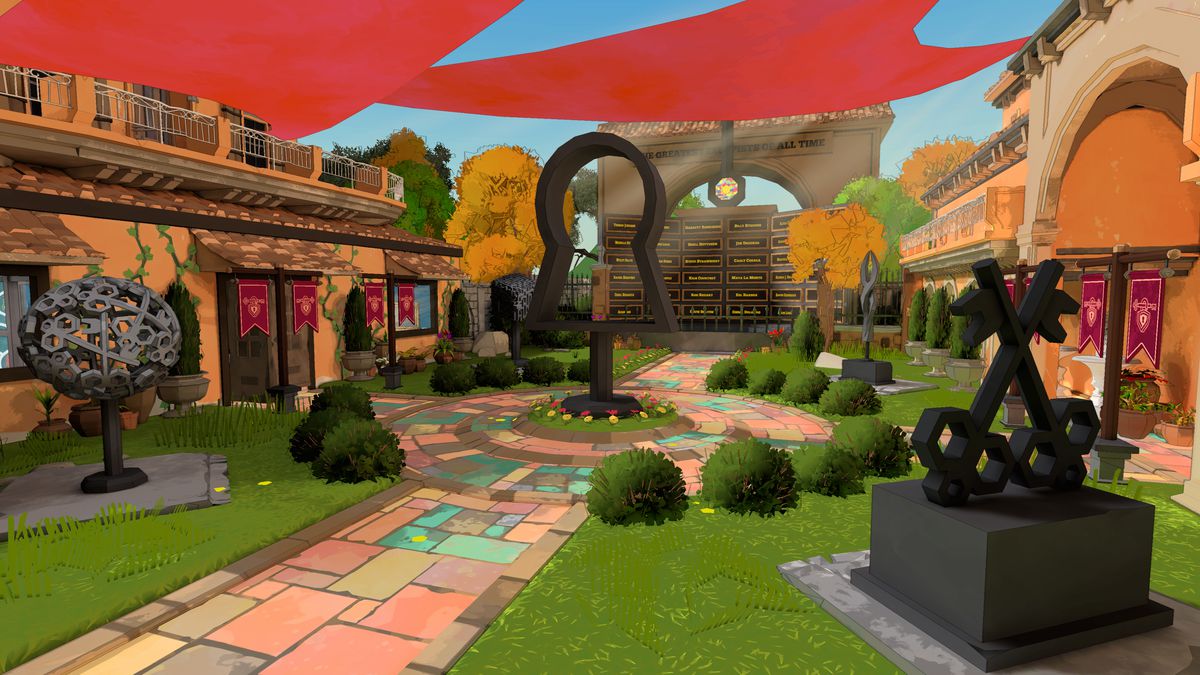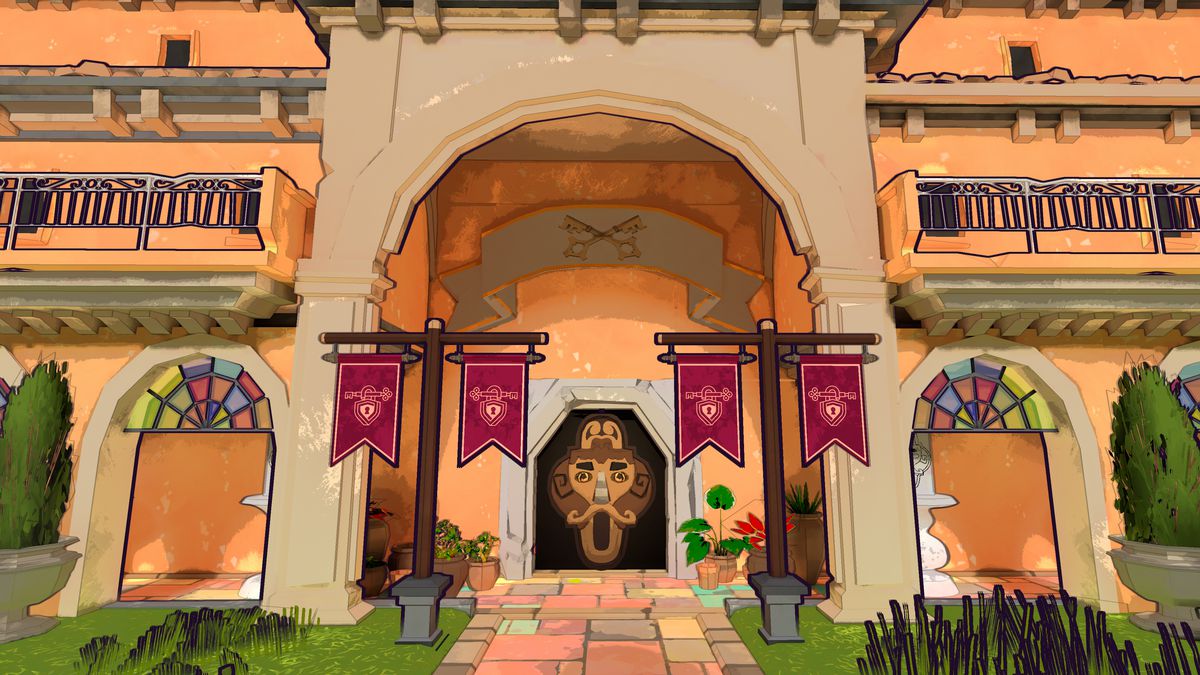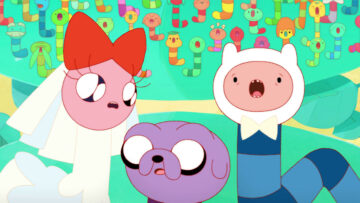Everyone adapted to the pandemic in different ways. For the developers at Coin Crew Games, it meant shifting their focus from physical arcade games and in-person escape rooms to a project that would let them leverage their strengths, but not require players to be physically in the room. The result is Escape Academy, which launches Thursday.
Coin Crew was founded in 2018 with the stated goal of “bringing people together to play.” Escape Academy meets that goal offering a virtual escape room experience. The game sends players to its titular school for aspiring puzzle masters, where the professors design unique challenges that may or may not involve the danger of painful death. In one level, a tower floods with water as players climb, from puzzle to puzzle, solving thematically themed challenges. Each level’s ladder to the next floor is blocked by a password revealed by puzzles in escape rooms. Learn, solve, and escape is the name of the game.
“A game should be something that you can do with a friend or with a spouse or with family, an activity that you can do to spend time together,” Mike Salyh, co-founder of Coin Crew, told me in an interview. “The game should be fun, but it should really facilitate a good interaction between people. Whenever I see people solve a puzzle and high-five, that to me is, like, the pinnacle. And whenever I see people fail to solve a puzzle, that’s when I break out my notebook and I start furiously trying to fix it.”
High-fiving is hard when you’re sequestered in your home, but Escape Academy is nevertheless highly tailored for social gameplay, whether you’re on the couch next to your partner or thousands of miles away. The game’s local and online co-op experiences are identical; either way, you see your teammate’s screen at all times. The vertical splitscreen limits your peripheral vision, which takes some getting used to. But the benefits of being able to see everything your partner sees, like clues on the other side of the room or notes they’ve pinned to their side of the screen, outweigh any momentary befuddlement players might feel.
Image: Coin Crew Games/iam8bit/Skybound Games
The idea of a school for escape room enthusiasts came from the need for distinct environments in which to set their puzzles, Escape Academy’s creators say.
“The more distinct environments we could create, the more cool puzzles we would be able to put in them, because environments really inform the puzzles,” Salyh said. “You can do different puzzles in a greenhouse than you can do in a tower filling with water than you can do in a computer lab. And so we knew we wanted to hit a really big range of environments. In our brainstorming we were coming up with settings that would allow us to take the player, in one story, through a lot of different settings.
“We came up with the idea of a school where the different professors are creating challenges for you to solve, which also solves another big problem in puzzle games,” he continued. “It’s like, why are there all these puzzles here? Every puzzle has a creator. You don’t, like, trip and create a combination lock. There’s got to be some mastermind behind it [in the lore].”
“And we may or may not have been watching a certain superhero anime at the time,” he added, causing both he and his Coin Crew co-founder, Wyatt Bushnell, to burst into laughter. (And yes, this Bushnell is related to Atari and Chuck E. Cheese founder Nolan Bushnell.)
During my chat with Salyh and Bushnell, we discussed a multitude of other puzzle games and games with puzzles in them, from The Witness, which does almost no hand-holding, to Tunic, which features an instruction manual written in a different language, to Uncharted, whose puzzles are dead simple because they aren’t the main focus of the game. Salyh and Bushnell have great admiration for those games, but the duo said balancing the puzzles in Escape Academy provided several challenges.
“It’s kind of a weird game to balance, because no puzzle gets repeated,” Bushnell said. “Every puzzle is totally unique in the experience. Every person is going to find different puzzles challenging, and different puzzles really easy, based on whatever your personal life experience is.”
“I think all of our puzzles are pretty difficult in a vacuum,” he continued. “A fun puzzle is a very hard puzzle that you have the tools to solve.”

Image: Coin Crew Games/iam8bit/Skybound Games
The clues in the flooding tower level range from coded messages with hidden translation keys to physical objects that you can place around the room to form letters and numbers. Each puzzle is indeed different, and each room felt solvable once we’d explored that floor of the tower, picking up tools and items and discovering which objects in the environment could be interacted with. Each room also featured a few red herrings, like shelves full of useless junk that had nothing to do with the puzzle. (Clicking on these generally results in some flavor text like “Look at all this useless junk!” that lets you know it isn’t part of the puzzle.)
“We put a lot of groups through it and kind of see, is this fun hard or is this un-fun hard?” Salyh said. “In general, we want players to win, but we want them to maybe run out of time a couple of times.”
The game also features a built-in hint system, because the developers didn’t want you to have to pause the game and Google anything. Much like you might raise your hand and get a clue from the actual game master in a physical escape room, you can press a button to get a hint in the game at any time. And the hints are tailored to each puzzle, a result of Coin Crew’s exhaustive playtesting practices. Salyh said they had four different groups of testers play puzzles weekly for a year. When a group got stuck and requested a hint, the designers wrote down whatever they told them, and used those notes as the basis for the in-game hints. That way, you never have to leave the game world, and you don’t feel like you’re cheating by looking something up.
[embedded content]
“I think that’s the really wonderful thing about puzzle games,” Salyh said. “When you play it, you get this, at first, kind of daunting, like, ‘Oh my god, can I ever crack this?’ And then when you solve it, you feel like a genius.” They want Escape Academy players to get those wins and experience that feeling.
Bushnell concurred.
“My favorite part about location-based entertainment was being able to like — this sounds very cheesy and a little douchey — but I really loved the being able to see a group of people playing an arcade game or an escape room, and it’s like, you know you’re going to be what they talk about at dinner that night,” he said. “You kind of get to see a memory get made. And I was a little afraid that we wouldn’t get that with digital. But then we launched the demo for the Cerebral Puzzle Showcase [on Steam], and being able to see people screening the demo or let’s plays of the demo, and getting to see people interact with puzzles without us there and having fun, that definitely scratched that itch.”
Escape Academy is available on PlayStation 4, PlayStation 5, Windows PC, Xbox One, and Xbox Series X.












